Deborah J. Ross's Blog, page 31
February 11, 2022
Short Book Reviews: A Luminous Collection by Sheila Finch
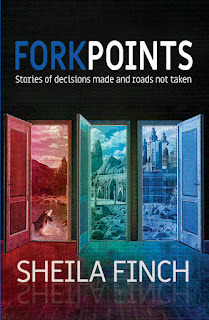 Forkpoints, by Sheila Finch (Aqueduct Press)
Forkpoints, by Sheila Finch (Aqueduct Press) Sheila Finch is one of the treasures of modern science fiction. She’s literate, imaginative, and deeply insightful. Her contributions to the field include not only specific, awesomely good works, but her careful attention to how language shapes story structure and flow. Her short fiction works are like polished gemstones, with each facet reflecting and informing the central theme. Here is a collection of such jewels, each speaking to the profound transformative power of human understanding. We are more than our circumstances, these stories say, we have the ability to shift our perspective, to look and feel more deeply, and thereby to shift entire realities. From an elderly music teacher who could also have been an iconic physicist to an extraordinary communication across species to a time-traveler visiting his own ancestor during the World War II London bombings, each tale reaches deep into the mind of the reader, inviting us with Finch’s characteristically gentle wisdom to see the universe and ourselves in a revolutionary light.
February 7, 2022
ARCHIVES Northlight: Evolving a Novel
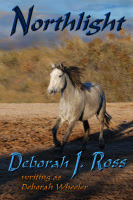
After I submitted Jaydium, which was to become my first published novel, I began work right away on my next project. Or rather, I took a look at all the ideas and characters which were screaming inside my skull to be made into stories and tried to decide which one would cause me the most anguish if I didn't work on it first. High on my list was to rewrite the last novel I'd written before Jaydium. It had received careful attention, not to mention three single-spaced pages of critical feedback, from the editor who would later buy Jaydium.
I felt that if an editor had taken that much time and trouble with the book, there was something of value, something that perhaps I was now a good enough writer to bring out fully.
The book's working title was Weiremaster, and it was based on the world of my very first professional short story, "Imperatrix", which appeared in the debut Sword & Sorceress anthology. Weires are bipedal ape-like creatures, seven-feet tall, fanged, silver-furred, immensely powerful and receptively telepathic. In the world of "Imperatrix," they obey people of imperial blood. For the purposes of that short story, no further explanation was needed.
Now, years later, my world-building had matured. I wanted to know how these creatures had come into a human world, how the control worked, and how the dynastic characteristic had been established. I concocted an adventure which would lead my hero into the world of the Weires and back home again, changed. He would carry me -- and the reader -- along with him, a classical hero-quest.
I began the story as Terricel, a young scholar, received word that the democratically elected ruler of his city had been killed -- shades, no doubt, of my own memories of the Kennedy assassination. "Imperatrix" had portrayed a worthy monarchy, with heavy overtones of The Divine Right of Kings. Now I shifted in my world view to a populist leader. After all kinds of political turmoil, a second main character appeared -- Kardith, a Border Ranger, looking for help in searching for her missing partner, Terricel's sister. And so the action began.
When I sat down to actually write the new version, I realized that the assassination had to happen on the page or not at all. It was simply too pivotal an event to tell second-hand. And twist them as I might, I couldn't seem to make the politics of the city anything but deadly boring. I wrote and rewrote the first 150 pages four or five times, until I was heartily sick of them. And they were still boring. The shift toward democracy had been right in tone but wrong in emphasis. This wasn't in essence a political story.
Then I asked myself, When does the story get interesting? I realized that everything up to the entrance of Kardith was preparatory. She came barging into the city -- and Terricel's staid scholarly life -- and set off the chain of events that made up the backbone of the story. Okay, I said to myself, let's chuck the preliminaries and get right to the good stuff. But what about the assassination, which plays a pivotal role in shaping future events? I moved the assassination in time to shortly after Kardith arrived in the city. And as I wrote about these events, something strange and wonderful happened.
Kardith herself started talking to me.
I'd known she was brazen, obstinate, darkly humorous, an accomplished knife fighter. But as her voice came clearer, I realized that she was telling me a much more powerful and moving story than I ever envisioned. Her courage and the abiding pain of her past ran like a counterpoint through the dramatic action.
You can't turn a story over to someone like Kardith and expect it to come out unchanged. By the time Kardith was done with it, there were no more Imperials and no more Weires. There was, instead, a far different world to be explored, and very human lessons to be learned.
One of the interesting questions that comes up is how much of the author is in the character. This was particularly relevant since Kardith is a knife fighter, and I used techniques from my style of kung fu (san soo, as taught by Jimmy H. Woo) in describing her fighting style. I'd never written a character who was so vivid and yet so different from me. But I never felt that Kardith was me; rather, she was someone I had something in common with. I think a writer needs the sensitivity and imagination to have empathy for the character she creates; there must be some bridge, some understanding, but the character must not be limited to the writer's own experience and taste. It was only logical that a character as colorful and determined as Kardith would shape the story in a new direction.
But the direction was not hers alone. She'd brought along Terricel and had given him a new name, Terris. In the original version, Terricel was a cipher, a place holder whose function was to take the reader along on the adventure. After Kardith was through telling her tale, I was left with a wimpy, Terricel-sized hole in the story.
Terris turned out to be a more complex character than I'd dreamed, just as full of surprises as Kardith was, and more difficult to get a hold on. For one thing, Kardith's focus was intensely personal and emotional, whereas Terris had the ability to see a larger picture, to dream larger dreams. His gifts were those of empathy and imagination. He took Kardith -- and me -- clear across the wilderness to places and times I hadn't imagined existed.
If Kardith was the story's heart, Terris now became its soul. With the two of them as anchors, I could now explore the political aspect of the story without turning it into a recitation of dreary details. The book acquired a new title, Northlight, which then became a metaphor for transformation. But the center of the story remained with these two characters, their dreams and passions, the web of their lives. In order to find that center, I had to be willing to let go of my preconceptions of what the story "was supposed to be" in order to discover what it could become.
Afterword: In the process of bringing out a digital version of Northlight, I refocused the cover image. Judith Tarr was kind enough to allow me the use one of her splendid horses for Kardith's gray mare.
February 4, 2022
Short Book Reviews: Puritans Vs Forest God, with Animal Cruelty Warning
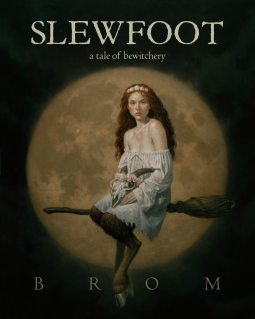
Slewfoot: A Tale of Bewitchery, by Brom (Tor Nightfire)
I was interested in this book as historical fantasy, with its setting in mid-17th Century New England among the Puritans. The main character, Abitha, was appealing and her situation, as a non-Puritan bride trying to adjust to the rigidity of life in mid-17th Century New England, sympathetic. I liked that the Puritans were not monolithic; some were kind, others cruel and ambitious, some devout, others pragmatic. Abitha’s husband genuinely cares for her and tries to shield her against his greedy, ruthless brother, whose schemes would have both of them working as indentured servants. Then there is Slewfoot, an ancient spirit with amnesia, that the talking animals “wildfolk” want to use to wipe all humankind—Native and European settlers alike—from the forest. What the heck does “slewfoot” mean, anyway? I looked it up: in hockey it means, “using your leg to take someone off balance from behind by sweeping the back of their knee, often resulting in injury.” It could be a version of “slue-foot,” meaning “having big, clumsy, or turned-out feet.” Neither of these really applies to the goat-headed creature that enters into a partnership with Abitha, half-savior, half-demon. Which of course does not go over well in a Puritan community.
Without giving too much away, I found the moral ambiguities unsettling. Clearly, some of the human Puritans are hateful, using piety as an excuse for cruelty. But so, in their way, are the wildfolk. There don’t seem to be any ethical concerns about their deadly interactions with Native communities, or the ease with which even sympathetic European characters are slaughtered. Abitha’s eventual pact with Slewfoot stuck me as one that leaves behind compassion and human fellowship as well as desperate circumstances. There was no resolution, no consequences, no arc of justice. The worst part, though, was the torture and eventual killing of her beloved cat. If I had known such a scene was gratuitously added, I would never have read this book. Consider this fair warning if you, too, are an animal lover who treasures the trust and affection of our feline friends.
February 1, 2022
Scoundrels in Space StoryBundle

I was on the screening committee that put together this StoryBundle. Lots of awesome stuff here, folks!
The Science Fiction Writers of America (SFWA) is releasing its newest StoryBundle, Scoundrels in Space, offering a large selection of ebooks from independent and small press science fiction writers! The StoryBundle can be purchased here: https://storybundle.com/scifi
The ebooks in this collection feature the con artists, thieves, and space pirates of tomorrow that fascinate us, all the more because these motley ne’er-do-wells so often end up saving the universe despite their incorrigibility! Pick up the SFWA Scoundrels in Space StoryBundle and get to know twelve such spacefarers who live on the fringes of a dozen wildly different worlds, until circumstances force each of them into hard choices and more adventure than they expected.The Scoundrels in Space StoryBundle will be available for a limited time, from February 2 to February 24. Readers pay $5 or more for the initial four ebooks. Spending $20 total unlocks eight more ebooks that they receive with their purchase. Once February 24 passes, this particular collection will never be available again! Further details about how StoryBundle operates are available at https://storybundle.com/faq.
Core BundleFlotsam by R J Theodore
Severance by Chris Bucholz
Toccata System by Kate Sheeran Swed
Tyche’s Flight by Richard Parry
Bonus Books
Lex Talionis by R. S. A. GarciaWreckers by George EllisThe Quantum Magician by Derek Künsken
The Blackwing War by K.B. Spangler
House of Shards by Walter Jon Williams
Barbarians of the Beyond by Matthew Hughes
Border Crosser by Tom Doyle
Romance on Four Worlds: a Casanova Quartet by Tom Purdom
January 31, 2022
Author Interview: Louise Marley on The Great Witch of Brittany
Award-winning author Louise Marley has long been one of my favorite writers. From the chillingly prescient The Terrorists of Irustan to the deeply touching The Glass Harmonica, to the YA "Horsemistress" series (as Toby Bishop), to the music-themed Mozart's Blood and The Brahms Deception, the scope and insightfulness of her writing mark her as a major voice in fantasy and science fiction. Her newest novel, The Great Witch of Brittany, will be released in February 2022.
Deborah J. Ross: Tell us a little about yourself. How did you come to be a writer?
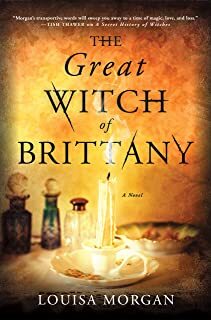
Louise Marley: Like so many of us, I was an avid reader as a child, and it followed logically—since I am by nature a performer—that I wanted to write stories myself. My musical ambitions dominated the first part of my life, but I always meant to return to writing. It has been amazing to learn how much the two careers have in common.
DJR: What inspired your book?
LM: There is no one factor that inspires any of my novels, but the witch novels definitely had their origins in my fascination with witchcraft and the practice of it. I had fallen into the habit of writing historicals, and so the historical settings for A Secret History of Witchesand now its prequel, The Great Witch of Brittany, came naturally.
DJR: What authors have most influenced your writing? What about them do you find inspiring?
LM: I love many writers, from the Western authors I read as a girl to the Golden Age gothic mysteries to the great feminist science fiction writers of the latter half of the 20th century. I’m often inspired by the most recent really good novel I’ve read, and I find that enriches my own imagination. I’m not tempted to copy, fortunately, but I learn and absorb from some of the amazing prose and incredible plots I find. Thrillers have been my most recent indulgence, and wow! do those writers know how to plot!
DJR: Why do you write what you do, and how does your work differ from others in your genre?
LM: I’m extremely lucky to be in a place where I can write what I want to write. My last four books have featured witches and witchcraft, and I do hope they have my own particular stamp on them, which is working witches—women who have to study and practice and explore to make their magic work. I’ve found that the witch genre has many facets, and lots of excellent writers are working in it, with results that vary from terrifying to downright funny.
DJR: How does your writing process work?
LM: I’m very active physically, by necessity. High metabolism, I suppose. I need to move and exercise, especially in the mornings, so in the past few years I’ve developed the habit of practicing yoga and walking the dog in the morning, along with any chores that need doing. 1:00 p.m., I sit down to write, and that’s pretty much my day until 5:00, when I almost always close my computer, with confidence that I will return the next day. (Yes, I write every day. Almost compulsively.) This is one area in which my musical life and my writing life are parallel, because as a singer 1:00 was the ideal time to vocalize and study whatever music was coming up.
DJR: What have you written recently? What lies ahead?
LM: I’ve been both busy and lucky since 2017, when A Secret History of Witches was published by Orbit/Redhook. That book did very well, and gave me the freedom to do a quite different novel, The Witch’s Kind, which is hardly witchy at all, but a solid historical. The Age of Witches came next, a book that is very witchy indeed, and now, happily, The Great Witch of Brittany comes out next month. That book, I’m pleased to say, was inspired by the readers of Secret History, who asked to know the story of the Orchière witches’ ancestress, the great Ursule. It was an absolute joy to get to discover her story.
DJR: What’s the strangest or most touching fan mail you’ve ever received?
LM: One I will always remember came after my novel The Glass Harmonica was published. The medical condition at the heart of the story was one the writer told me her husband suffered from, and she asked if I had any non-fictional information about the treatment used in the novel. Sadly, I did not. I’ve always wondered about her and her husband, and hoped they found help.
DJR: What advice would you give an aspiring writer?
LM: Write. That’s the big one. An hour a day might produce a page or two, and at the end of a year, there’s a draft.
I have lots of other advice, but so much of it is specific to the writer and the project they’re working on. I’m a big believer in classes and conferences and workshops, all of which I’ve taught, and all of which I’ve taken myself. I’m a big avoider of anything advertised as a “method,” an aversion I developed as a professional singer. Every writer needs to find her own process! Also, take critiques with a grain of salt. Use what works, and say thanks for the rest, but let it go.
 Louise Marley is an award-winning writer of fantasy, science fiction, and historical fiction. Much of her work is influenced by her first career as a classical singer, most recently her novel, Mozart’s Blood. Writing as Louisa Morgan, she is the author of A Secret History of Witches, The Witch’s Kind, and the newest book, The Age of Witches. Louise lives in beautiful North Idaho with her family and her spirit familiar, Oscar the Border Terrier. Visit her at www.louisemarley.com.
Louise Marley is an award-winning writer of fantasy, science fiction, and historical fiction. Much of her work is influenced by her first career as a classical singer, most recently her novel, Mozart’s Blood. Writing as Louisa Morgan, she is the author of A Secret History of Witches, The Witch’s Kind, and the newest book, The Age of Witches. Louise lives in beautiful North Idaho with her family and her spirit familiar, Oscar the Border Terrier. Visit her at www.louisemarley.com.
January 28, 2022
Short Book Reviews: A Dynamite Conclusion to the "Ghost Roads" Trilogy
Angel of the Overpass, by Seanan McGuire (DAW)
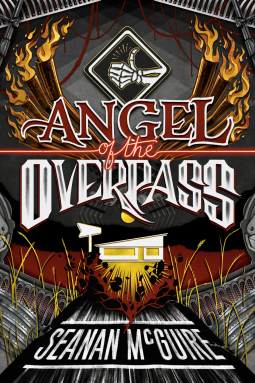
I’m an enthusiastic fan of Seanan McGuire’s “Ghost Roads” series. I love the inventiveness of the world, the plot twists, and the ghostly-but-eminently-human narrator, Rose Marshall. A half-century ago, Rose was on her way to her high school prom when she was run down and killed. The driver was teenage heart-throb movie star, Bobby Cross, desperate to ensure his immortality through a crossroads bargain that requires him to keep driving a car that runs on the fuel of human souls. Bobby’s been on Rose’s trail ever since, determined to feed her soul to his car. Meanwhile, Rose’s prom date, having lived a long life regretting her loss, has become a ghostly car that communicates with her through his choice of tunes on his radio. Got all that? Now the crossroads themselves have been destroyed, and the realms of the ghosts have become increasingly unstable. And Bobby’s getting closer.
Rose may be dead, a “hitch-hiking ghost,” but she still retains her compassion and her gift for deep friendships. She’s capable of both growth and self-sacrifice, and her personality shines through the pages.
Absorbing and highly satisfying, Angel of the Overpasslifted my own spirits. I’ll come back to this series again and again.
January 24, 2022
Author Interview: Jessica Thorne
 I loved Jessica Thorne's time-travel supernatural mystery thriller, The Lost Girls of Foxfield Hall, which I reviewed here. Jessica was kind enough to answer a few questions about her work. I was delighted to learn how many sources of inspiration we have in common.
I loved Jessica Thorne's time-travel supernatural mystery thriller, The Lost Girls of Foxfield Hall, which I reviewed here. Jessica was kind enough to answer a few questions about her work. I was delighted to learn how many sources of inspiration we have in common.Deborah J. Ross: Tell us a little about yourself. How did you come to be a writer?
Jessica Thorne: I always wanted to write, to tell stories. Even as a child I was obsessed with fantasy stories. I grew up on Tolkien and Star Wars, Diana Wynne Jones and Susan Cooper, and read my way through the local junior library before moving to the bigger one in the next town. Eventually the librarians gave me a ticket for the adult library there as well. I ended up being both a librarian and a writer. I don’t think there was ever another option.
I write under multiple names. Currently I mainly write as Jessica Thorne but I have previously written as Ruth Frances Long for Young Adult fantasy, and as R. F. Long for adult fantasy. It isn’t as confusing as it sounds because the books are quite different. With my Jessica Thorne books I am now leaning towards a blend of fantasy and women’s fiction which is an interesting combination allowing me to explore all kinds of interesting themes in a different way. I keep the one website for all my books, and readers can find everything at www.rflong.com.
I tend to wander from genre to genre as the story takes me so multiple names can be helpful in that respect.
DJR: What inspired your book?
JT: The Lost Girls of Foxfield Hall was inspired by a number of things. I always loved books like Tom’s Midnight Garden and The Children of Green Knowe, and the idea of lives permeating a place with magic. The story grew out of the idea of the maze at the heart of Foxfield’s gardens. The women of Foxfield Hall come from a long tradition of powerful women, and the many different aspects of being a woman. Their loves and lives kind of took off from there.
DJR: What authors have most influenced your writing? What about them do you find inspiring?
JT: So many it’s very hard to nail down just a few. I would definitely point to Susan Cooper and her Dark is Rising sequence as a formative series of books. I love the idea of ancient magic persisting in the modern world, living alongside us known only to a few. Similarly Alan Garner’s books were an incredible influence as I try to capture his “rockiness of rocks and treeness of trees”. Diana Wynne Jones taught me to “put the magic out with the milkbottles” while Terry Pratchett constantly reminds me that the truth is always far stranger than anything we can get away with in fiction. And of course, to have fun with it.
DJR: How does your writing process work?
JT: I do a lot of thinking initially. I don’t plan the story but I need to learn the world it will be set in. There is a lot of research there, mainly through folklore and locations. I love to lose myself in a place. I also use music for mood setting and to get myself deep into the characters. I think you need to write from a place of love. Once I’m writing I try to meet a specific word count each day. What that is depends on the book. Sometimes it’s a range rather than a word count. I work in the mornings in a specialist library, (Libraries again!) and so my writing time is mainly in the afternoons and evenings. I like noise around me while I work, music or terrible tv.
DJR: What have you written recently? What lies ahead?
JT: My most recent book is The Bookbinder’s Daughter, set in a magical library, for which I drew from my professional life as my imagination. It came out in September 2021 and is available now. It tells the story of Sophie, who returns to the library where she spent her childhood, where her Bookbinder mother disappeared, and finds a world of magic and mystery which needs her help if it is to survive. It is very much a book of the heart and there are so many elements of it I adore. Not least our hero Will, and his errant black cat Titivillus.
I am currently working on a new novel based on the legend of the lost city of Ys, The Water Witch, due out in 2022.
DJR: What advice would you give an aspiring writer?
JT: It’s a cliché, I suppose, but write what you love, not just what you know. You’ll have so much more fun doing it. Don’t try to write what’s popular or successful at the moment. By the time you have finished your book that moment may have passed. Write the book you really, really want to read. It’s still hard work, but it’s worth it. And never give up.
~~~~~~~
Ruth Frances Long / Jessica Thorne writes romance and fantasy from the heart which often strays into weird and wonderful liminal places. She works in a specialized library of rare & occasionally crazy books.
As Ruth Frances Long she writes young adult fantasy, often about scary fairies. In 2015 she won the European Science Fiction Society Spirit of Dedication Award for Best Author of Children’s Science Fiction and Fantasy for A Crack in Everything.
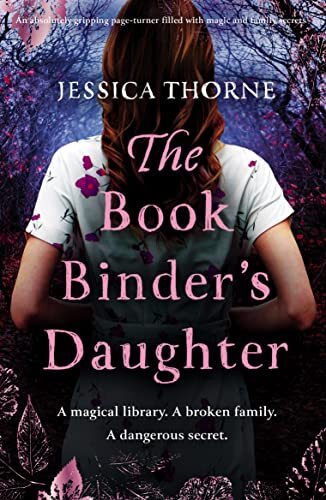
As Jessica Thorne she writes adult fantasy women’s fiction, which wanders from Space Opera to time travel to epic fantasy, including The Bookbinder’s Daughter, The Lost Girl’s of Foxfield Hall, The Queen’s Wing, Mageborn and Nightborn. The Stone’s Heart was nominated for the Romantic Novelists’ Association Romantic Fantasy novel of the year in 2020.
Find her at:
http://www.rflong.com
@RFLong on Twitter
January 21, 2022
Book Reviews: Two Ecological-Disaster Futures
Today the Earth is warming. By how much and where the mean final temperature will fall, we don't yet know. Much depends on how we use the decreasing window of action. This, of course, is fodder for science fiction writer. Suppose we fail to act, or fail to act in a timely fashion? Once the floods and wildfires, the population migration and species extinction have run their course, will oceans cover the globe? Might humanity find refuge on floating piles of garbage from centuries of discards?
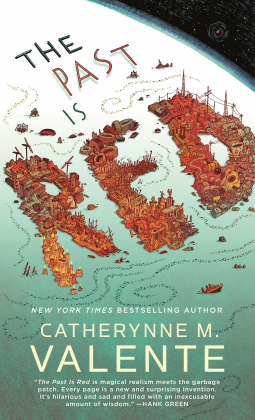 The Past Is Red, by Catherynne M. Valente (Tordotcom)
The Past Is Red, by Catherynne M. Valente (Tordotcom)In this ecodisaster future, warming temperatures and melted ice have resulted in a global ocean, devoid of solid land. Humans have survived on floating islands of garbage, arranged during The Great Sorting into various types. The island called Garbagetown has a district of electronic parts, Electric City one of expired prescription drugs, and so forth. The unwanted scraps of civilization provide a life that is at once filled with hope and despair. Their patron saint is St. Oscar the Grouch.
With a lot of jumping around in time, we follow Tetley Abednego from an earnest teenager to an adult universally reviled among the inhabitants of Garbagetown, although we don’t learn what her crime is until very much later. Any person is allowed to insult or physically assault her, short of killing her, on a whim, and all she is allowed to say is, “Thank you for my correction.” Her romance with Goodnight Moon leads to the revelation of a desperate scheme that will either bring the inhabitants of Garbagetown to dry land or destroy their future forever. Added to that, a strange device discovered in the mounds of discards comes to life with equally unexpected results.
Valente’s imagination never fails to bring to life worlds and peoples that are both fantastical and touchingly familiar. Despite the warning of a world in which melted ice has swelled the endless oceans, her characters embody hope and the human capacity to find joy and love even in the most depressing times. On the other hand, I had difficulty with the casual cruelty of Garbagetown inhabitants toward Tetley, especially before I had the context to understand the impact of what she had done. The jumping around in time confused me in places. But these objections pale beside the entirety of the story: endlessly inventive, often humorous, occasionally tragic, always hopeful.
Humans being humans, we will likely try to reverse the disaster of our own creation. Already there is talk of seeding the atmosphere to increase the sun's reflectivity, satellite-driven sunshields, plastic-eating bacteria, and the like. We who have grown up on speculative fiction ask, "What could possibly go wrong?" What, indeed--another ice age?
The Ice Lion, by Kathleen O'Neal Gear (DAW)
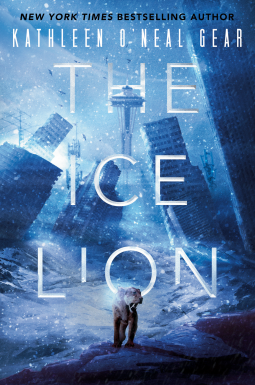
What a topical book! In the far future, the grand attempt to halt the Earth’s runaway warming has met with equal disaster. The result was a new and apocalyptic Ice Age with glaciers three miles high and a poisonous slime, “zyme” covering the oceans. As the planet descended into this frigid nightmare, the last scientists recreated species that had survived earlier Ice Ages: dire wolves, helmeted musk oxen, cave lions, and extinct, archaic human species like the Denisovans (distant relatives of Neanderthals) and Homo erectus. As the planet grows even colder, tribes of these hominids vie for territory and food.
Against this background, two teenaged friends, hunter Quiller and visionary Lynx navigate an increasingly hostile terrain. The cold seasons are growing ever longer and the “Rust People” more dangerous. When Lynx goes off on his marriage honeymoon and the camp is attacked by lions, he freezes. As a result, his new bride is killed and he is sentenced to exile and a spiritual journey to confront the mythic giant ice lion. Instead, he encounters an aged shaman who just might be the last of the true humans. Quiller, who has secretly been in love with Lynx, must choose between following him to defend him against the dangers of the wilderness and joining the fight to preserve her tribe.
This book, the first of “The Rewilding Reports” has many strengths. Prose that melts away, leaving the reader immersed in the story; a wealth of sensory detail that bring the world to vivid life; compelling characters and relationships; skillful clues and escalating revelations. The end marks a partial resting place where the drama of this first adventure is resolved but the characters still face ongoing danger and mysteries yet unsolved. Despite the bleakness of this future, the all-too-human denizens move forward with hope, joy in one another, and awesome competence.
A final word: There is apparently a new genre or subgenre of literature called "cli-fi." These two certainly fit, although I find the term unfortunately suggestive of something else.
Short Book Reviews: The Dark World of Mexican Vampires
Certain Dark Things, by Silvia Moreno-Garcia (Tor)
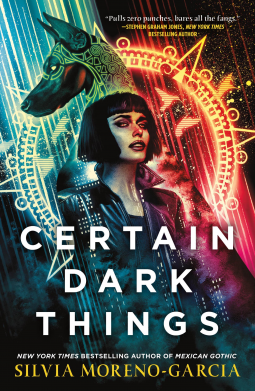
Silvia Moreno-Garcia continues to knock my socks off, literarily speaking. Her Gods of Jade and Shadow was nothing short of breath-taking. Now she turns her wild and dark imagination to a vampire tale set in Mexico City. In this world, there are not one but many kinds of vampires, each with its own history, weaknesses, and predilection for bloodshed. Certain Dark Things tells the story of the perilous friendship between street-kid Domingo and Atl of the Aztec line of vampires whose family has been wiped out by the viciously violent narco-vampire clan. Atl is young and inexperienced in vampire terms and has led a carefree life, never having to make hard choices. Now she’s on the run for her immortal life. She’s the most beautiful woman Domingo has ever seen, and he can hardly believe his luck when she accepts his help. Atl’s only hope for a way to safety lies in fleeing Mexico, but to do that she needs documents available only through a secret and highly elusive vampire underground. Unfortunately, she soon attracts the attention of both crime bosses and a cop dedicated to exterminating her kind.
I’d classify this book as dark urban fantasy rather than horror, but it should appeal to readers of both genres. If you’ve never read Moreno-Garcia, you’re in for a treat.
January 17, 2022
I Survived a Nigerian Scam Part III: Disaster Mode

As 2021 drew to a close I realized that I had fallen into a scam I hadn’t heard of: befriending a person on social media and then inducing them to set up a GoFundMe for a medical emergency. Fortunately, I came to my senses before I sent any money from that campaign. Until then, it had never occurred to me that I had been manipulated over a year and a half. As embarrassing as the experience was for me, I’m going public in the interests of educating others.
Part I: Setting the Hook.Part II: Raising the Stakes
Donations to the GoFundMe I had set up for C’s sister came in as I promoted it on social media and directly to friends and family. C ramped up his emotional manipulation and shifted to urgent/disaster mode.
C: Dec 3, 2021, 10:57 am. The doctor called today and i went to see him. He said he's going to help talk to the financial department to allow us pay part payment so they can schedule S's surgery but he said the surgery will likely be January because of the Xmas break and that there are many patient awaiting sugary who has completed all payments. So he asked me how much we have to make deposit and i told him and he said the financial department will only accept a part payment of $7000 and we should make available the balance before the surgery will be carried out
C: The reason why he gave the suggestion is because he said if we make available the full payment Sarah must have to wait because other patients have already been scheduled for surgery and it might take a little bit long. He said it is better we have a date fix for the surgery why will raise funds instead of raising the full payment and still wait for the hospital to fix a date for the surgery
Commentary: C sent a phone photo of a one-page statement with a flat fee for dialysis and surgery. That struck me as odd, given the itemization by American hospitals. The other dubious thing was that the statement was signed by the nephrologist. Do Nigerian doctors handle hospital financial arrangements? And what hospital closes for the Christmas break? I wasn’t yet suspicious enough to try to verify details with an internet search. When I did that, I was unable to find the hospital (the name was a for-profit chain, but I didn’t see this specific location or specialty). The nephrologist was a real doctor who practiced in India. I found no mention of S in the entering classes of her medical school.
What happened next was indeed fortunate. In the midst of C’s increasingly frequent and importunate pleas, Western Union declined to process the transfer twice. I went through two phone interviews, since apparently they flag all transfers to Nigeria, and as I answered, I could see the warnings go up, one after another. C began urging me to send the money through another, cash-based service, but I had to wait for Western Union to refund the money to my account. Then, almost by happenstance, I spoke with the manager and one of the tellers at my local bank. I do mean, “local.” We’re a close-knit community, and I’m on a first-name basis with the manager. The teller, upon hearing the situation, got very emotional about it being a scam. It turned out that a relative of hers had lost hundreds of thousands of dollars to a romance scam. I wasn’t thrilled with her warnings, but her words caused me to step back and ask myself, “What if this really is a scam?”
Once I started questioning, the red flags went up everywhere. Most of them are mentioned above in my comments. What clinched it was this email from C:
C: Dec 7, 6:18 PM. Please, don't allow anything happen to my only sister please am begging you with the name of God. The hospital management agreed to accept part payment which is not their policy but it was the help of the resident doctor who plead on our behalf because he saw how things was really bad for us and the expenses of keeping S much longer at the hospital. Please take it within yourself to go to the MoneyGram so we can at least add the money you want to send and the one we already have with us to at least get a date for the surgery while we still look out to raise the remaining balance for the surgery, thanks and God bless you.
I didn’t reply.
C: Dec 8, 2021, 11:07 am. Can i ask you for a favour please. I wanted you to help talk to the doctor on my behalf because he feels i don't want to make the payment like he advised me to become i told him i already raised the advance payment and he didn't believe me because i told him i was going to make the payment this week. Why i want you to talk to him is because i told him my friend in the US is the one raising the money for S’s surgery and secondly the only uncle i have is not educated and he lives in the village and can't speak correctly apart from my local language so since you are educated and expose, talk to him that you are the one raising the money for the surgery bill and you had difficulty transfer the money to Nigeria because of the bad reputation Nigeria had in the international community
Commentary: There was no way I was going to talking to a Nigerian “doctor.” I had not the slightest doubt that I’d be speaking to an accomplice who would pressure me into a commitment to send the money immediately in untraceable cash. In checking C’s FB profile, I saw his nickname as “C Billion” and memes saying, “Billionaire Values.” His occupation was listed as motivational speaker. I wondered how I had never noticed these things before. I also searched for GoFundMe scams and discovered that persuading someone in the US to set one up for a beneficiary in a non-eligible country is a known strategy.
Returning to my story, C wasn’t done trying.
C: Dec 9, 2021, 11:26 am. Hi, i hope you are good? I'm really depressed right now and i need someone to talk to. I don't know if you can be of help??
Me: I've decided to not go forward with this. I've contacted GoFundMe and the donations are being refunded.
I blocked him on FB.
A few days later, C messaged me on Instagram:
C: December 15, 2021 10:46 am. Please don't be upset. We have know each other for years now and have come a long way. if i have wrong you in anyway i am sorry all am asking is for you to tell me where i went wrong please for the sake of our friendship over the years. Why don't you tell me what i did wrong and hear from me?
December 16, 2021 1:30 am. Even if you don't want us to be friends at least just tell me what i did to you that you got upset and never want to hear from me. If probably i have wrong you, don't have deserve the right to find out what i did wrong?
December 18, 2021 3:08 pm. Please just tell me what i did wrong and i promise not to write you again. I just want to say am sorry to you and i promise to say away from you
December 21, 2021 10:36am. S is dying Why do you have to abandoned us at this time? You would have heard from me before taking any action but rather you choose not to which i think was wrong considering our friendship over the years. My sister is lying there in the hospital with no one to help. Life has been so difficult for us this few weeks but i believe God has a plan for us and whatever we are going through right now will all be history tomorrow but i won't stop being greateful to your family for all what you did for us, thank you so much!
Commentary: By this time, I knew better than to respond. I wondered how S had gone from hospitalized on dialysis to dying, and decided it was yet another attempt to push me into crisis mode. I saw the final sentence as a way of “leaving the door open” to further manipulation.
I blocked and reported him on Instagram.
While I was preparing this blog series, I unblocked C on FB to refresh my memory. He messaged me with Merry Christmas greetings without any reference to his last messages. Keeping the door open and pulling for renewed engagement, indeed!
A few parting comments. I’ve become much more suspicious about new requests on social media. Social media creates the illusion of a relationship (C’s reference to “our friendship over the years”). Wanting to be open-minded and kind opened me to manipulation. Finally, scammers can be very, very good at what they do. They know how to exploit openings and push through them.
I am incredibly lucky to have lost such a small amount of money and to have discovered the GoFundMe scam in time. I wrote to all the donors, apologized, and returned their money. They were amazingly understanding. I also contacted our mutual FB friends and explained the situation. One told me that he had “hit on her for marriage.” Others said they were immediately suspicious of him. I said their instincts were better than mine!
As embarrassing as this entire episode has been, I’ve been given the chance to make things right. One part of that has been to make financial restitution to those who have been so generous and who have trusted my judgment. Another has been to share this story, with details and analysis I wish I had known before. Perhaps in the future it might help somebody else.
This image is licensed under the Creative Commons Attribution-Share Alike 2.0 Generic license.



